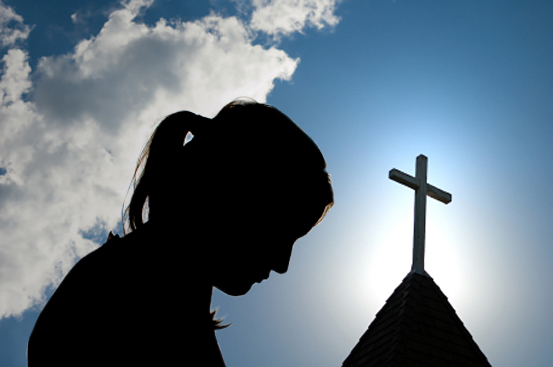My fourth visit to the United States only confirms what I knew already – that the American people are an extraordinarily generous, open and friendly people; however, they are also a people whose goodwill and often naivety are much abused by Europe and successive US governments. The ruling American elite with its global machinations, arrogance, bankruptcy and taxes is one thing; ordinary Americans are quite another. What has struck me on this visit is the retreat and defeat of what I would call Traditional America. A great country is now ruled by a New America, which is increasingly and systematically anti-Christian: this is the America of abortion, corruption, drugs, churches for sale, Atheist-TV and bullying support for anti-Christianity imposed by its elite on its people and on the rest of the world. New America is choosing not a ‘wonderful life’, but the nightmarish alternative proposed in that classic film.
In other words, the fragments of America’s Christian Tradition are disappearing very rapidly and I can say – with enormous sadness – that much that I still saw here on my last visit in 2008 has already been lost. A country that until recently was famed for its Church-going and Christian values is becoming like even sad, decadent, transvestite Europe – and perhaps even worse, because in Europe there are at least the reminders of historic, physical, architectural remnants of the old Christian culture. There now seems to be little to choose between America and Europe. The admirable America of deep, homespun Bible tradition and wisdom and anti-federal libertarianism is dying – and it is tragic. In this context we can see the two great challenges, if Christianity, especially in its integral Orthodox Church form, is to survive in the USA. These challenges are the two struggles against Conformism and Consumerism.
Conformism
American history has been marked by intolerance, which clearly has its origin in Puritanism. All must swim with the tide; otherwise you are ‘un-American’. All have heard of the Salem witch-trials. All have heard of slavery, racism, civil war and blind Puritan phariseeism. But what happens to Puritanism in a post-Puritan and atheist society? The intolerant reflex does not disappear – it becomes the witch-hunt of those who consider, for example, that homosexual marriage or abortion are sins, that LGBT is an illness, or indeed, that any sin is sin and vice is vice. It becomes the witch-hunt of those who consider that drugs are just a new form of slavery and destroy the freedom of the individual. The New America says: Anything goes – if it ‘feels good’ and is ‘fun’, then ‘let it all hang out’. In other words, Puritanism has, by reaction to the restrictive rigidity and frigidity of the past, been turned upside down; now all is permitted, except the denial that all should be permitted.
Intolerance abounds in New America against whatever is deemed to be against the peculiar fashion of political correctness, a set of moral prejudices which is quite striking in its utter inanity and illogic. Anti-Christian political correctness is the new Puritanism, the new intolerance. The conformism and intolerance of a rapidly developing post-Protestant and militantly atheist society are frightening. The first temptation for Orthodoxy in such a society is then the temptation to conform, to cease being itself for fear of being different, to demote itself. For decades now, we have seen how many Orthodox here, ‘for fear of the Jews’, have wanted to give up their identity and become clean-cut ‘All-Americans’. Thus, the first things to be jettisoned (if they still exist) are monasticism and the Orthodox calendar – in favour of the Catholic/Protestant/secularist calendar. But that is only the start.
Thus, they say, make the priests shave their beards, cut their hair short and put on clerical collars; let there be pews and organs and robed choirs in the churches; let candles no longer be used and icons be taken out; let the churches resemble Methodist and Baptist tabernacles; let fasting be abolished and confession be reduced to a yearly comfort-talk by a psychologist (‘you must not feel guilty about anything you may have done wrong; it is not your fault’); let communion be compulsory; let churches be made into social clubs as with the Episcopalians, Presbyterians and all the others, where (paid) entertainment, ‘show-time’, is provided, business can be conducted and the main thing is how many ‘activities’ you have. Repentance, prayer, liturgical life and asceticism as the reasons for the existence the Church are forgotten. Conformity to civil society, and not to the Law of God, is the norm.
As regards liturgical language, there are two tendencies. The first is compulsory all English by intolerant order and any mention of Russian, Greek etc must be forbidden. In the OCA ’Russian’ was physically removed from signboards, utterly failing to understand that ‘Russian’ does not mean ethnic Russian. Often English is accompanied by Protestantization and Church life becomes salt that has lost its savour. Alternatively, you can use your language to reinforce the community as a Russian, Greek, Serbian, Romanian, Bulgarian etc ethnic club with food and folklore. That is quite acceptable – just so long as it is not a Church, that it has no spiritual identity or life, but only a cultural and sociological one – just like Protestant churches or, for that matter, Polish/Hispanic/German Catholic ones. Here the deciding factor is class, and in the USA class is decided by how much money you ‘make’.
Consumerism
The USA is the land of the dollar, of materialism, of mammon. The lower class here is the poor, the upper class is the rich. Nothing is defined, as in Europe, by your name, family, good taste, manners or culture. The new ‘nobility’ is defined by money, in other words, by how you consume and how much you consume – and the corresponding clothes, body shape (created in the clinic or the gym) and cult of youth. Unfortunately, this also conditions Christianity. Christianity here is generally a cafeteria Christianity, a ‘pick and mix’, ‘go as you please’, selective Christianity. You don’t like the priest because he tells you to stand at church and fast and does not look like an ‘American’? He’s not ‘fun’, not ‘cool’ – sack him – that’s what consumer shareholders do to those who are not fun and not cool. Otherwise, go to another store – denomination or jurisdiction – and change brands – that is, ‘change churches’.
Consumerism is born not of hierarchy, but of ‘democracy’, of the rule of the crowd, and so is always defined by the lowest common denominator. In other words, it is reductionist. And this means, for example, that Orthodox churches become Sunday only churches and services become very short – they are reduced both in quantity and quality. Forget vigil services; think of bingo. The danger here is that Orthodoxy – and there is in fact only one sort of Orthodoxy, albeit in different languages – begins to develop into a novel and secondary form of Orthodoxy. Instead of the Orthodox Tradition, there has developed in the USA a liberal Orthodoxy, a ‘new Orthodoxy’, an ‘American’ Orthodoxy, an anti-ascetic Orthodoxy, a comfort religion, one that is fit not for those who want to pray, but for those who want to pay, for ‘consumers’. To combine God and Mammon is what they want.
Those who have ‘invested’ in inventing such an Orthodoxy are not interested in quality, but rather in quantity. How many are there here? The numbers game is what it is all about. ‘Reach out and get the customers through the doors’. Thus, ‘outreach’ televangelism is crowd-pleasing marketing. Churchgoers are customers, with credit cards in their pockets, and can be polled in especially by personalities. In this way Christ is forgotten and replaced by personality cults. Brought out of Russia by secular-minded intellectuals, personality cults have spread through the European and American diasporas, merely reflecting the secular cult of celebrities. Secular society lives, as in ancient times, on bread and circuses, on fast food and fun, on MacDonalds and Disney. The same crowd-pleasing tendencies are present outside the Church but also in some Orthodox churches in the diaspora.
The consumerist cult of fun is particularly visible in secular American society and from there it is spreading around the world, including into Church life. Now, ‘fun’ is a euphemism for the pleasing of everything that is not the soul. Its sign is infantilism and infantilism is the main characteristic of modern Protestant and Catholic ‘worship’. The crowd or audience, because that is what the people are, are treated as children, with guitar music, clapping, dancing, sentimentalism and manipulation. Such ‘churches’ and ‘services’ in no way resemble anything known to Christian history. The saints, who replace celebrities in the Church, did not know of ‘fun’ and were not infantile. Infantilism and fun are manipulative novelties invented for an anti-ascetic, post-Christian and indeed anti-Christian world to make Church services into entertainment shows. ‘Fun’ kills the sacred.
Conclusion: The Tradition
What is the solution? Clearly conformism, which is only the sociological, not the theological, must be avoided. Orthodox have a clear-cut identity, we are very different from Protestants – as well as from Catholics in America, who are almost entirely Protestantized. We have a different faith and worship the unfilioquized God. True, there is only one God, but not all worship God, many worship manmade substitutes. True, there is the other extreme to conformism, which is usually expressed by Protestant-minded converts, who want to be different just for the sake of being different. They cultivate the exotic, the foreign, the ethnic, old calendarism, and any extreme of dress or outward practice. Here there is only the psychological, not the theological. But we follow neither the sociological nor the psychological, we follow the spiritual, expressed in the Tradition of the Holy Spirit.
In so doing we do not cultivate differences just for the sake of them. Our differences are primarily internal, not primarily external. Thus, when we need to begin the inevitable transition to English – and to proper, grammatical, liturgical English, not to street Immigrantese, for we do not repeat the errors of Catholicism 50 years ago – we just do it. Thus, we do not lose the sense of the sacred, the atmosphere of prayer, respect and devotion which characterize Orthodoxy. Languages are only vowels and consonants in different orders: a change of language is not the problem, a loss of authentic piety is the problem. In all things our task is neither to seek to conform, nor to be different for the sake of it, but simply to be faithful to the Tradition of the Holy Spirit, which is above liberalism and conservatism. The Church does not conform to the world – the world conforms to the Church.
The Mid-West, May 2014

















